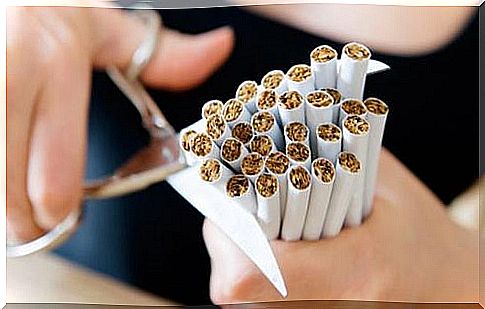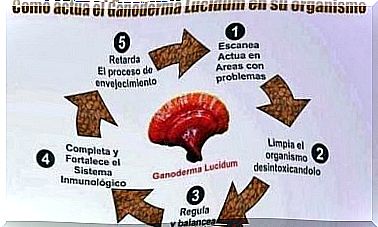5 Remedies To Clean Your Lungs After Quitting
After smoking the last cigarette, your body begins to recover from the damage that tobacco has left it. With good nutrition, exercise, and delicious cups of tea, you can help your lungs clear themselves.

If you have already managed to extinguish your last cigarette without falling into the temptation to light a new one, the first thing we must say to you is: Congratulations! We applaud your effort for this great achievement for the benefit of your health and that of your closest ones.
From the first cigarette to the last pack you smoked, your body suffered a slow and progressive deterioration in many ways. The lungs, of course, have been especially affected by nicotine and other toxic agents in cigarettes.
It’s never too late to quit

Smoking not only damages the respiratory system, but also puts the entire organism at risk. However, when you quit smoking, the body begins to recover almost immediately.
20 minutes after the last cigarette, blood pressure and heart rate begin to return to normal. At 8 hours, the nicotine level in the blood drops by more than 90%; and at 12 hours, excess carbon monoxide is removed from the lungs and oxygen levels are restored.
Having smoked a lifetime is no excuse to keep smoking. A study in Germany found that smokers up to 70 years of age benefited from quitting. Despite age, the risks of having a heart attack or stroke decreased by 40% after 5 years of quitting smoking.
Quitting the cigarette completely is what your body needs. Do not fool yourself with electronic cigarettes: they are only a palliative to reduce the smoke and the smell, but the toxins continue to damage your body. You can clean your lungs after quitting smoking with the recommendations that we leave you below.
How to clean your lungs after quitting smoking
From the second week after putting out the last cigarette, the annoying withdrawal symptoms worsen. After the fourth week, they tend to disappear, while your lung function begins to improve. To clean your lungs after quitting smoking, we leave you the following tips.
1. Increase the consumption of anthocyanins
Flavonoids are a wide range of phytonutrients found in fruits and vegetables. They are recognized for their anti-inflammatory and antioxidant properties. Within the group are anthocyanins, which are very effective in reducing mucus in the respiratory tract. These are found in red, blue and purple vegetables and berries.
The high consumption of flavonoids in general, and of anthocyanins in particular, is associated with a reduction in lung deterioration, both in non-smokers and among those who have stopped smoking. They also help relieve non-physical symptoms such as anxiety, which appear after quitting smoking.
Incorporate foods rich in antiocyanins into your diet such as:
- Strawberries
- Cherries
- Blueberries
- Raspberries
- Plums
- Blueberries
- Black currants
- Purple cabbage
- Purple potato
2. Follow the Mediterranean diet

The Mediterranean diet combines delicious flavors with foods with beneficial properties. This type of diet favors the use of vegetables, vegetables and fruits ; the consumption of meat is reduced compared to the intake of fish.
This diet incorporates the consumption of foods rich in flavonoids, so necessary in the lung recovery process:
- Olives and olive oil
- Garlic
- Onion
- Peppers
- Garbanzo beans
- Kale
- Capers
- Basil
- Oregano
- Almonds
- Walnuts
This form of diet will provide other extraordinary benefits for the ex-smoker’s body:
- Lowers bad cholesterol (LDL)
- Regulates blood pressure
- Prevents cancer cell growth
- Strengthens bones
- Prevents strokes
- Decreases aging generated by tobacco
3. Add vitamins to your diet
To clean your lungs after quitting smoking, you have to increase your intake of vitamins. These will benefit the recovery of your immune system so that you can prevent infectious diseases of the respiratory tract.
- You can find vitamins A and C in citrus fruits .
- The beta-carotenes found in orange fruits and vegetables help lower the risk of respiratory infections.
Note: Although the best source of vitamins comes from food, if you are in the recovery stage from the damage caused by cigarette smoking, it is a good idea to turn to dietary supplements.
4. Exercise your breathing capacity
After quitting, the ex-smoker begins to experience increased coughing. While smoking, the capillaries that surround the bronchi, the cilia, literally paralyzed and stopped fulfilling their function, which is to remove mucus. Just two weeks after quitting, the cilia start to grow back and start doing their job. That is why the cough appears.
In order for you to eliminate that mucus and clean your lungs after quitting smoking, it is necessary to do activities that allow you to exercise and increase your breathing capacity. Yoga and swimming are two fundamental exercises since they put your breathing capacity to the test. If you’ve had a more sedentary lifestyle, you can also start with walking routines where you pick up the pace for short intervals.
5. Discover the benefits of tea
A study published in March 2018 by the American Chemical Society found that nanoparticles can be found in tea leaves that can help the immune system eliminate about 80% of lung cancer cells.
Ingredients
- 1 cup of water (250 ml)
- 1 tablespoon of tea herb (black, green, white and oolong) (15 g)
- 1 tablespoon of expectorant herb leaves (elderflower, fennel, marjoram, mallow, plantain, anise or eucalyptus) (15 g)
- Honey (optional) (to taste)
Preparation
- Boil the water and add the two selected herbs.
- Cover the pot and remove from the heat.
- Add the honey. This not only sweetens, but also enhances the expectorant properties of this tea.
- Take two or three times a day to help your lungs clear of accumulated mucus.








